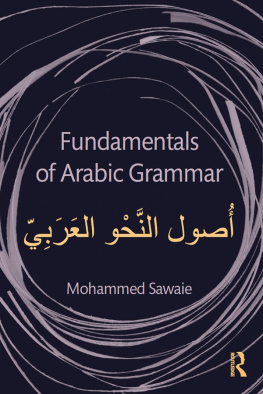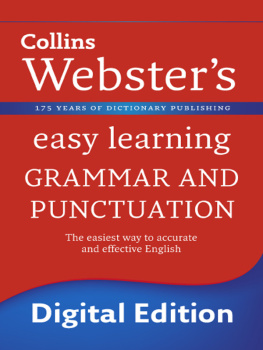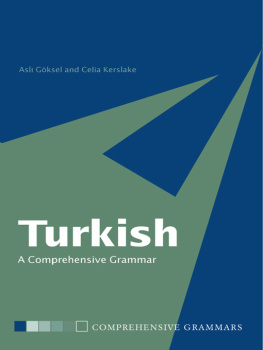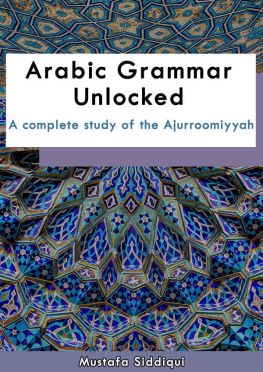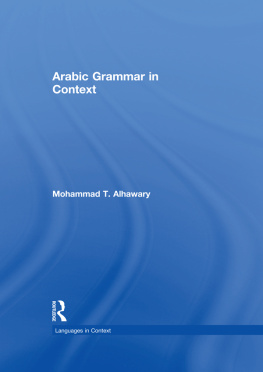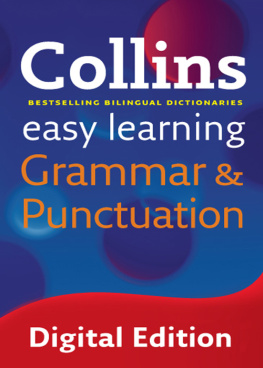Fundamentals of Arabic grammar
Fundamentals of Arabic Grammar provides an authoritative guide to Modern Standard Arabic (MSA) grammar. It has been organised to promote a thorough understanding of MSA grammar and presents its complexities in a cohesive and user-friendly format, filling many gaps left by other textbooks. Explanations are clear, full and accessible and extensive cross-referencing, two generous indexes and six appendices provide users with easy access to the information they require. No prior knowledge of linguistic terminology is required.
Features include:
Expert treatment of a full range of grammar topics and structures, including the case system, IDhaafa, the equational sentence, quantifiers and the vocative, generously spread across thirty-eight chapters
Special attention to parts of speech, such as nouns, pronouns, adjectives, adverbs and prepositions, given at the beginning of the book to acquaint students with the basic units of Arabic and provide a solid foundation for further learning
A wide range of contemporary examples drawn from real life to provide a solid context for grammar points, further supported by word glosses and idiomatic translations of sentences
Grammatical terms given in both Arabic and English
A wide variety of supplementary learning resources such as practice sheets, exercises and verb tables available to download free at http://www.routledge.com/books/details/9780415710046/
A substantial bibliography incorporating primary Arabic grammar sources in addition to secondary sources in Arabic and in English.
Fundamentals of Arabic Grammar has been field tested over a number of years and has been written by a highly experienced teacher of Arabic. It will be an essential resource for students and teachers of Arabic at all university levels and is suitable for use both as a companion reference text in Arabic language courses and as a standalone text in independent grammar classes.
Mohammed Sawaie is Professor of Arabic in the Department of Middle Eastern and South Asian Languages and Cultures at the University of Virginia, USA.
Fundamentals of Arabic
Grammar
Mohammed Sawaie
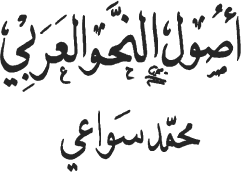

First published 2014
by Routledge
2 Park Square, Milton Park, Abingdon, Oxon OX14 4RN
and by Routledge
711 Third Avenue, New York, NY 10017
Routledge is an imprint of the Taylor & Francis Group, an informa business
2014 Mohammed Sawaie
The right of Mohammed Sawaie to be identified as author of this work has been asserted by him in accordance with sections 77 and 78 of the Copyright, Designs and Patents Act 1988.
All rights reserved. No part of this book may be reprinted or reproduced or utilised in any form or by any electronic, mechanical, or other means, now known or hereafter invented, including photocopying and recording, or in any information storage or retrieval system, without permission in writing from the publishers.
Trademark notice: Product or corporate names may be trademarks or registered trademarks, and are used only for identification and explanation without intent to infringe.
British Library Cataloguing in Publication Data
A catalogue record for this book is available from the British Library
Library of Congress Cataloging in Publication Data
A catalog record for this book has been requested
ISBN: 978-0-415-71003-9 (hbk)
ISBN: 978-0-415-71004-6 (pbk)
ISBN: 978-0-315-88180-8 (ebk)
Typeset in Calisto
by Graphicraft Limited, Hong Kong
: .
..
I have observed that no one finishes the writing of a book who does not say afterwards: had this change been made, the book would have been better; had this item been added the book would have been better appreciated; had this item been moved forward the book would have been more beautiful. In this lies the most important lesson: it is proof of the inherent imperfection of all humans.
Al-cImad al-Isfahani (died 1201 AD)
Kharidat al-Qasr wa Jaridat al-c ASr
Contents
This work originated as notes on Arabic grammar made while teaching Arabic as a foreign language at various levels, from beginning to advanced, and independent courses on Arabic grammar in a university setting over many years. I am indebted to Vivian Bishara McCormack for her encouragement to write down this material, and for her contribution to the early drafts. Barbara A. Brothers was always supportive and encouraging. Omima El-Araby witnessed the completion of an early draft, read the manuscript and offered many suggestions for improvement during her tenure at the University of Virginia, while teaching a joint course with me for a number of years. Students who used this material and tolerated the often last-minute production of rough chapters deserve sincere thanks. Many thanks to Farzaneh Milani, current Chair of my department, for providing funds to have the book manuscript edited professionally.
Numerous colleagues, friends and former students from various regions of the world read this material in its varying stages and contributed to its improvement: Abdulkarim S. Ramadan, Adel S. Gamal, Medhat Credi, Omar H. Okasha, Ahmad Abu Dalu, Benjamin Smith, Thomas Wilson, Ellen Duthoy, and Mohammed Rabbaa. To them all, I offer sincere thanks. I also thank anonymous reviewers, some of whose comments were helpful. I cannot express in words my gratitude to Cecilia F. Blewer for her encouragement, support and constant probing for a better understanding of grammar, and for her deep interest in improving this work. Susan Dempsey was most helpful in offering technical support. To the Routledge team, Andrea Hartill, Geraldine Martin, Isabelle Cheng, and Helena Power, Copy Editor, I extend my gratitude for their efficiency and cooperation at all stages of bringing this work to publication. From those who contributed to this work and were not mentioned I ask forgiveness.
The rise of the grammatical tradition among Arabs is tied closely to the rise of Islam and its holy book, the Quran. This book became a subject of study and linguistic analysis in the seventh century A.D. This is no different to the development of grammars of other nations that was stimulated by religious or other major works: the Vedas gave rise to the grammar of Sanskrit, Homer to the Greek grammar, the Biblical canons to Hebrew and the book of Confucius to Chinese.
The first book on Arabic grammar, al-Kitaab, was authored by Sibawayhi in the eighth century. Since then, many schools of Arabic grammar have developed, with various competing regional and intellectual paradigms resulting in a great number of books from various perspectives and for different purposes. Through such works, the Arabic language has been minutely and painstakingly analyzed and set out in countless descriptions by eminent scholars writing in Arabic as well as in major Eastern and Western languages.
This work is not intended to add one more book to the distinguished list of classics on the subject. Rather, it is intended for a special audience: students learning Arabic as a foreign language at university level. One of its major goals is to present the fundamentals of Arabic grammar to those in the process of acquiring the language in an easy-to-read format.
This material consists of topics essential to the mastery of Arabic as a foreign language, both orally and in its written form. It treats the grammatical issues integral to language learning at university level, both undergraduate as well as graduate. Various grammar details and innumerable complex exceptions to rules, endemic to classic Arabic grammar books and university-level grammar courses in Arab universities, were deliberately left out.

